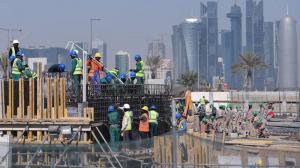“Modern Slavery”: French Construction Company Vinci Accused of Labor Violations on Qatar Construction Contracts

Migrant workers in Qatar. Photo courtesy Sherpa
Sherpa, a French NGO, has asked courts to investigate Vinci, a French construction company, for violation of migrant workers rights in Qatar. QDVC, a Vinci subsidiary, has €2.2 billion ($2.3 billion) in infrastructure contracts for the 2022 World Cup soccer tournament including a new subway and an orbital highway.
QDVC is partially owned by the Qatar Investment Authority (QIA), the government sovereign wealth fund, which in turn owns a block of Vinci’s shares. Some 9,000 workers are employed by the company in Qatar.
The complaint was filed with the public prosecutor of Nanterre, a Parisian suburb, against Vinci’s Construction Grand Projets division. Laetitia Liebert, managing director of Sherpa, says that the organization has obtained signed complaints from as many as 15 workers.
The organization says that the migrants were forced to work an average of 66 hours a week in stifling heat under dangerous conditions. Laborers were housed eight to a room and frequently had their passports taken away so that they could not escape.
“It is modern slavery,” Sandra Cossart, a Sherpa lawyer, told the Associated Press. “Modern slavery does not consist of shackling and whipping workers. It is subtler: the penal code defines a vulnerable population, under the threat of an employer and extreme economical dependency, as having no choice but to accept the deplorable working conditions and therefore renew its contract,” the organization said in an official statement.
Such working conditions are relatively commonplace in the Middle East where migrants make up the majority of the working population – beginning from unskilled jobs like janitorial and food service to upper level management positions. Workers from south and south east Asia often work for a pittance in order to send money home to support their families. Qatar has some of the highest numbers – 94 percent of employees are migrants.
Qatar has recently come under the spotlight because of the frenetic pace of work on vast new construction projects that have been commissioned for the prestigious World Cup soccer tournament in seven years time. Investigations by the Guardian newspaper and Amnesty International have both documented abuses by workers.
The government has had a hard time denying these claims – a report by DLA Piper, an Anglo-American law firm, on behalf of the Qatari government, estimated that between two and three worker die every day on the job in Qatar because of the pace of the summer work at temperatures that soar above 50 Celsius (122 F).
Vinci categorically denies the allegations. “We have repeatedly welcomed unions, international NGOs and journalists onto our building sites,” the company said in a press statement. “They have ascertained that we do more than merely comply with local labour law and respect fundamental rights. All QDVC employees are free to retrieve their passports at any time, and we strictly observe working hours and rest time.”
But if Vinci is found guilty by French courts, Sherpa will have grounds for a lawsuit.
“Under European law, European firms can be sued for serious labor violations in their supply chain abroad,” Nicholas McGeehan of Human Rights Watch told the Associated Press. “Where Qatar and the other Gulf states are concerned, it’s probably more a question of when a European construction firm gets sued rather than if.”
Vinci has announced that it will counter-sue Sherpa for libel but the NGO is unbowed,
“We will not cave in easily to pressure,” Sherpa wrote in a press statement. “Since filing our complaint, many employees of Vinci’s subcontractors who complained about Vinci’s practices have reached out to us expressing their support. One of these employees reported that s/he was also threatened with a defamation suit.”
Meanwhile, almost 5,000 people have signed a petition to urge Christiane Taubira-Delannon, the French minister of justice, to open an investigation into Vinci.

